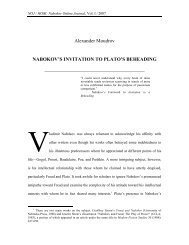domesticated translation: the case of nabokov's translation of alice's
domesticated translation: the case of nabokov's translation of alice's
domesticated translation: the case of nabokov's translation of alice's
You also want an ePaper? Increase the reach of your titles
YUMPU automatically turns print PDFs into web optimized ePapers that Google loves.
NOJ / НОЖ: Nabokov Online Journal, Vol. II / 2008<br />
209). However, as Umberto Eco writes in <strong>the</strong> Introduction to Experiences in Translation:<br />
“Every sensible and rigorous <strong>the</strong>ory <strong>of</strong> language shows that a perfect <strong>translation</strong> is an<br />
impossible dream” (Eco 2001: ix).<br />
Nabokov’s <strong>translation</strong> <strong>of</strong> Alice into Russian is admittedly successful. Obviously,<br />
in translating Carroll’s novel (1923), Nabokov considered primarily his future readers’<br />
abilities and interests, tending to create a <strong>translation</strong> that would be as accessible as<br />
possible to <strong>the</strong> mind <strong>of</strong> a child. He tried to convey to <strong>the</strong> Russian children <strong>the</strong> humor, <strong>the</strong><br />
originality and <strong>the</strong> brightness <strong>of</strong> <strong>the</strong> paradoxical and attractive Carroll's world, his sense<br />
<strong>of</strong> <strong>the</strong> absurd, and his amazing gift for games <strong>of</strong> logic and language. Just as a foreignized<br />
<strong>translation</strong> is intended to create a feeling <strong>of</strong> entering an unknown world, a <strong>domesticated</strong><br />
<strong>translation</strong> must provide a recognizable and familiar atmosphere for <strong>the</strong> reader. At <strong>the</strong><br />
same time, Nabokov refused to oversimplify his <strong>translation</strong> or to patronize its young<br />
audience with simplistic <strong>translation</strong> solutions.<br />
TRANSLATING PARODIES<br />
The novel Alice’s Adventures in Wonderland presents dilemmas to all translators.<br />
Julian W. Connolly calls Nabokov’s version “one <strong>of</strong> <strong>the</strong> most ingenious and delightful”<br />
(1995: 19). Exploring Nabokov’s <strong>translation</strong> methods <strong>of</strong> adaptation <strong>of</strong> <strong>the</strong> original to <strong>the</strong><br />
Russian milieu, Connolly particularly stresses his “free spirited approach” in transferring<br />
Carroll’s parodies <strong>of</strong> didactic verses (1995: 20-21) with admirable ingenuity and<br />
creativity. The poems in Alice are parodies upon familiar rhymes which are related and<br />
intertextually connected to <strong>the</strong> Victorian English culture. It is clear that <strong>the</strong> target readers
















